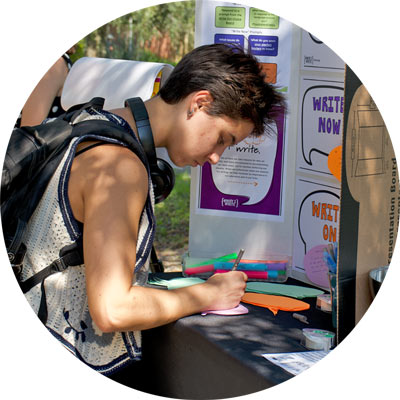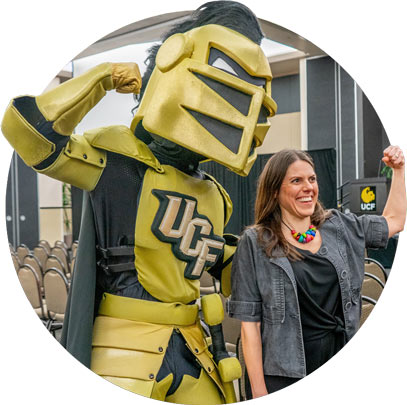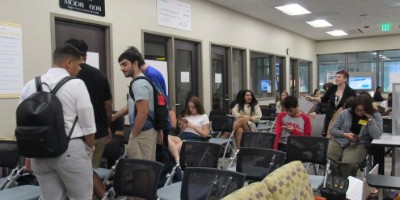
Celebrating a Year of Accomplishment, Empowerment, and Connection in Writing and Rhetoric
During the 2024–25 academic year, the Department of Writing and Rhetoric (DWR) students, faculty and staff continued innovative programming and strengthened a collaborative culture of critical reflection. This year we celebrated the retirement of one of our department’s founding faculty members, welcomed a team of ten new faculty and staff members, deepened our commitment to ethics with emerging technologies and critical AI literacy, and launched new partnerships that extend the impact of writing and rhetoric beyond the classroom and into communities.
In fall 2024, we welcomed ten new colleagues whose expertise and energy are already making a powerful impact. One of our new team members is Administrative Assistant III Nicholas Henriques ’24, who recently graduated from the College of Business. Henriques is passionate about student success, growth and developing meaningful relationships with young professionals, as he supports the DWR graduate program. Assistant Professor Meghan Velez brings a research agenda on how definitions of “good” writing shape and are shaped by institutional and community policies and practices. Velez has expanded our department’s interdisciplinary reach and commitment to inclusive inquiry, particularly through her research and teaching on GenAI technologies. Kara Taczak, assistant professor, is a nationally recognized scholar in writing pedagogy and transfer theory. Taczak is co-editor of the flagship journal, College Composition and Communication (CCC). Both Velez and Taczak enrich our teaching, research and community engagement, and we are excited to have them as part of the DWR community. Read more on colleagues new to the department in 2024-25.

This year marked an expansion in our work with generative artificial intelligence (GenAI) technologies. Through meaningful integration of GenAI in writing instruction, students were invited to ethically, critically and creatively engage with GenAI. Students were asked to use GenAI tools for brainstorming, revising and coding data within assignments that emphasize ethical reflection and digital literacy. These practices helped students develop critical thinking skills and prepared students for real-world writing contexts. In a wide range of writing classes from first-year composition to graduate studies, faculty welcomed dialogue and instruction around GenAI to enhance student learning through assignments that involved prompt engineering, genre analysis and visual rhetoric. Critical AI literacy was a central theme, with many faculty emphasizing the importance of evaluating GenAI outputs for bias, accuracy and credibility. Students were encouraged to understand GenAI as a fallible tool and to reflect on its ethical implications. Transparency was also prioritized, as instructors included AI use policies in syllabi and requiring students to disclose when and how they use AI tools.
Many of the DWR faculty earned GenAI microcredentials and certifications, and they were actively involved in AI-focused workshops, book clubs and working groups. These initiatives fostered a community of practice and supported ongoing professional development. Building on the momentum of our new AI-focused certificate Artificial Intelligence, Big Data and Human Impacts, faculty members teaching upper-level undergraduate courses initiated reflection-based writing practices that center student awareness, critical comparison of AI-generated texts and attention to linguistic equity. Beyond the classroom, faculty lead institutional efforts to shape responsible GenAI integration. This year DWR initiated college-level workshops on GenAI with Kyle Jensen, assistant dean of artificial intelligence and emerging digital technologies at Arizona State University.
DWR faculty are contributing to national conversations on GenAI in writing and rhetoric through conference presentations, peer-reviewed publications and collaborative research. Department chair Sherry Rankins-Robertson served as an AI Faculty Fellow for AAC&U’s “Institute on AI, Pedagogy and the Curriculum.” Other projects include studies on GenAI and communication, reflective writing and chatbot-enhanced learning environments. Shane Wood, director of first-year composition, and Senior Instructor Deborah Weaver, director of the University Writing Center, have led the curricular charge around the integration of a non-generative AI chatbot accompanied by writing groups in the University Writing Center to launch in first-year composition during fall 2025 for “TEACH ME: Technology Enhanced Academic Communication to Help in Math and English,” a U.S. Department of Education National Institute of Student Success grant in partnership with Morgan State and Georgia State (2025-27).

The First-Year Composition (FYC) program reaffirmed its mission to support writing growth among linguistically diverse students, integrating AI with careful attention to ethics and inclusion. FYC faculty, led by Shane Wood, co-authored Principles for GenAI Use in First-Year Composition to guide syllabus policies and classroom instruction for FYC courses. These principles reflect our department’s pedagogical commitment to preserving student agency and process while engaging with the promises and limitations of GenAI. Our Knights Write Showcase keynote speaker Annette Vee, associate professor of English and director of the composition program at the University of Pittsburgh, talked about the functionality of large language models (LLMs) and offered research on how faculty and students are using these technologies; she provided students and faculty with pragmatic methods for enhancing student learning and supporting critical AI literacy.
The undergraduate program, championed by Stephanie Wheeler, offered robust programming in 2024-25 and students brought national attention to the writing and rhetoric degree. Honors student Hannah Benton represented DWR at both the Conference on College Composition and Communication (CCCC) and the National Conference of Undergraduate Research. Students benefited from a career development workshop that bridged classroom learning with real-world application. Students practiced articulating the value of rhetorical education in professional contexts, sharpened résumé writing, and received coaching on LinkedIn profiles from Kristin Paul ’24, marketing specialist at Loyal Source Government Solutions. In support of interdisciplinary engagement, DWR collaborated across the university to explore civic discourse, democratic literacy, and public writing. Wheeler facilitated a workshop on the role of rhetoric in political discourse with Aubrey Jewett in partnership with the University Writing Center — affirming that rhetoric is foundational to functional societies.
The University Writing Center is thriving, as they increased student volume by more than six percent and student engagement by 70 percent. Learn more about their outstanding year under the leadership of Deborah Weaver by visiting the UWC Spotlight. Under the direction of Laurie Pinkert, the Writing Across the Curriculum program supported faculty in the Faculty Summer Institute, helping align their curricula with best practices in writing across disciplines. The “WAC Wednesday” series delivered workshops focused on GenAI and student reflection. More than 100 UCF community members participated in the National Day on Writing hosted by WAC, as the program continues to champion accessible, inclusive writing instruction across campus.
Led by Melody Bowdon, the graduate program welcomed its largest incoming cohort in over eight years and celebrated the 20th anniversary of the Professional Writing Certificate. Kevin Roozen hosted a doctoral student from the Pontificia Universidad Católica de Chile, to support the student’s scholarly works in exploring research focused on semiotic trajectories of writing, learning and becoming. This year’s DWR graduate students showcased research in two Knights Write Showcase panels. We are proud of our many graduate student accomplishments: Nandi Mainer was accepted to the doctoral program at North Carolina State University; MeKenzie McElroy will begin Florida State University’s PhD program in Rhetoric in Fall 2025; Aminta Jackson, Priscila Schilaro Santa Rosa and Erin Shorthill began coursework in UCF’s Texts & Technology PhD program over the past year; Eric Williams is teaching full-time at a middle school. In Fall 2025, Jackie Cano-Diaz will assume the position as an English Language Arts teacher and Roz Rohrbaugh will begin as a DWR Visiting Instructor.
Faculty research productivity continues to climb in the areas of grants, publications and scholarly conference presentations. This year faculty secured nearly $140,000 in external research grants, awards and gifts. Laurie Pinkert and her interdisciplinary colleagues are in their final year of a five-year National Science Foundation grant. Blake Scott expanded his research efforts and secured a collaborative grant project with University of Florida colleagues funded through the Florida Department of Health. Melody Bowdon, Kara Taczak and Sherry Rankins-Robertson secured a CCCC research initiative grant for “Writing and Wellbeing Among Rhetoric and Composition Graduate Students.” Now in its fourth year, the department continues the community-engaged partnership with the Seminole Tribe of Florida through a grant funded by the Sam and Virgina Patz Foundation. This year DWR partnered with the Department of History to expand research efforts; we were pleased to represent UCF at the Association of the Tribal Archives, Libraries, and Museums alongside five other Florida universities who are partnering with the Ah-Tah-Thi-Ki Museum on the Big Cypress reservation.
While faculty research appeared in more than two dozen book chapters and journal articles, two faculty members had books appear in print this year, including Martha Brenckle’s new collection Inside a Snow Globe and Sherry Rankins-Robertson’s recent edition of her co-authored textbook The McGraw Hill Guide to Writing. Collectively, faculty presented nearly 50 conference presentations both nationally and internationally. Noteworthy international presentations included: global rhetorics scholar Esther Milu who continued her international research on Black global rhetorics in Kenya; Joel Schneier presented in Germany on his collaborative research on keystroke, emotions regulation and eye-tracking; Stephanie Wheeler presented her scholarship on rhetoric and pop culture in the Netherlands; Steffen Guenzel and Blake Scott spoke on GenAI and Technical Writing in Croatia.
In June 2025, our department bid a fond farewell to Senior Instructor Deborah Weaver, who retired from UCF after 27 years of service. As a founding member of DWR, Weaver has played a foundational role in the department since its inception in 2010. Her legacy is one of generosity, excellence and student-centered leadership. She helped launch the first Knights Write Showcase, an event that introduced the new department to the broader UCF community and contributed to the FYC Program’s recognition as a CCCC’s Writing Program Certificate of Excellence. In 2011, she founded Imprint, a student-run publication and experiential learning opportunity that many graduates cite as pivotal to their professional development. As the first undergraduate advisor, Weaver supported the creation of upper-division programs, including a major and minor, establishing student-centered systems that shaped the department’s growth.

One colleague credited Deborah Weaver with fostering a “culture of care” that has sustained the department through curricular and leadership changes. Weaver was recognized in 2017 by the Center for Success of Women Faculty as one of “31 UCF Women Who Have Been Instrumental in Shaping UCF.” She served as director of the University Writing Center from 2020–2025. In the center, she championed assessment-informed, student-focused practices and facilitated the student-engaged articulation of the center’s core values — respect, compassion, inclusion, adaptability, collaboration and learning. A role model and mentor to many faculty, Weaver exemplifies a deep commitment to student success, collaborative leadership and meaningful university service. She has served as a UCF lighthouse to students and faculty alike for nearly three decades, and she will be missed.
The College of Arts and Humanities thanks Sherry Rankins-Robertson for her service as chair of the department from 2020-25. During her tenure, Rankins-Robertson provided visionary leadership and transformative service. She secured over $311,000 in external funding to support community-based research with the Seminole Tribe of Florida and co-led, alongside Weaver and Wood, UCF’s contribution to a $7.6 million NISS federal grant to enhance student learning in first-year writing. She guided the department’s transition to robust online writing instruction and moved the department forward toward writing with emerging technologies.
Her leadership fostered a strong research culture, supporting 18 faculty promotions and over $697,000 in total grant funding over five years, securing the first postdoctoral scholar in the department and increasing undergraduate and graduate enrollments by more than 20%. She spearheaded programmatic assessment efforts, supported the expansion of certificate programs, advanced student support initiatives and strengthened departmental infrastructure and external partnerships. Guided by her expertise, the department’s composition program received its second CCCC “Writing Program of Excellence” award in 2023. A committed scholar, she has published multiple works, earned leadership certifications, and remained active in national service roles while teaching both on campus and in the local prisons. Her contributions have left a lasting impact on the department’s academic reputation, research productivity and student success. Rankins-Robertson will remain at UCF as a member of the faculty.
As we close this academic year, we celebrate the contributions, voices and vision of our students, alumni, faculty and staff. We continue to champion writing as a public, transformative act — one that shapes communities, challenges inequities and enriches lives.



